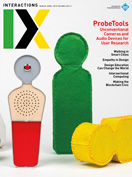Authors:
Hamed Alavi, Farzaneh Bahrami
Walking is the collaboration and confluence of body, mind, and place. It has been repeatedly acknowledged as the composing instrument of the city, generating social and urban life; as the most democratic and accessible physical activity; and as a cultural and aesthetic practice, a vital antidepressant, a heart saver, a non-dieting diet, and an antidote to cope with the syndrome of chairs and wheels. The rediscovery of walking may compete in importance with the invention of the wheel [1,2]. Insights Operating from the standpoint that walking is essentially a situated human experience, our aim is to develop a…
You must be a member of SIGCHI, a subscriber to ACM's Digital Library, or an interactions subscriber to read the full text of this article.
GET ACCESS
Join ACM SIGCHIIn addition to all of the professional benefits of being a SIGCHI member, members get full access to interactions online content and receive the print version of the magazine bimonthly.
Subscribe to the ACM Digital Library
Get access to all interactions content online and the entire archive of ACM publications dating back to 1954. (Please check with your institution to see if it already has a subscription.)
Subscribe to interactions
Get full access to interactions online content and receive the print version of the magazine bimonthly.






